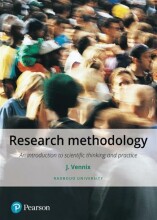Summary: Kwalitatieve Onderzoeksmethodologie
- This + 400k other summaries
- A unique study and practice tool
- Never study anything twice again
- Get the grades you hope for
- 100% sure, 100% understanding
Read the summary and the most important questions on Kwalitatieve onderzoeksmethodologie
-
M3, M6, M7, M8, B3, B4
This is a preview. There are 31 more flashcards available for chapter 10/01/2021
Show more cards here -
What is the main purpose of research design?A) To convince others to fund your researchB) To show you are capable of doing researchC) To provide a road map of the whole research projectD) To show that your research is viable
C) To provide a road map of the whole research project -
What is not an important requirement for a topicA) You are interested in the topicB) A faculty member is prepared to supervise youC) You can obtain relevant data on the topicD) Your topic is socially acceptable in your country
D) Your topic is socially acceptable in your country -
Research questions should be:A) Answerable and relevantB) Iterative and vitalC) Testable and assumptiveD) Realistic and abstract
A) Answerable and relevant -
Which of the following 5 steps of building a model of qualitative research design are iterative?A) Research methods and philosophical assumptionsB) Data collection technique and data analysis approachC) All of the aboveD) Non of the above
C) All of the above -
M4, M5, M9
This is a preview. There are 7 more flashcards available for chapter 10/01/2021
Show more cards here -
What categories within epistemology are most commonly used within social sciences when you conduct a qualitative research?A) CriticalB) PositivisticC) InterpretiveD) Socialistic
C) Interpretive -
Which statement does not apply to interpretive approachesA) The correct meaning of data is determined by the contextB) A good theory is one that helps to understand the meaning and intentions of the people being studiedC) Generalization that are more context boundD) Exact, forma land literal definitions, very precise
D) Exact, forma land literal definitions, very precise -
Which statement does not apply to positivistic approachesA) Facts are factsB) Meanings depends on contextC) Data are used to test theoryD) Hypothetico-deductieve logic
B) Meanings depends on context -
Which of the answers are not one of the four ethic principals of McNabb:A) TruthfulnessB) ThoroughnessC) ObjectivityD) Trust
D) Trust -
What does the Golden Rule mean?A) Apply the four ethical principalsB) Be truthful to othersC) Treat others as you want to be treatedD) Ask permission before you publish a persons work
C) Treat others as you want to be treated -
The deliberate copying of someone else’s work is called:A) In consentB) PlagiarismC) No permission to publishD) Unethical
B) Plagiarism
- Higher grades + faster learning
- Never study anything twice
- 100% sure, 100% understanding
































